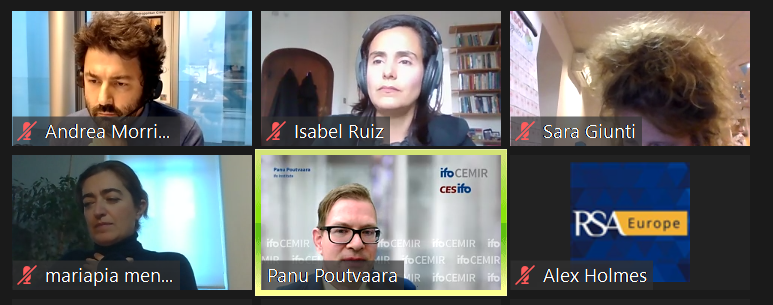Key conclusions of the #EURegionsWeekUniversity session: Refugees’ crisis: economic and social impacts

The recording of this session is now available on the REPLAY section of the event web: https://euregionsweek2020-video.eu/video/euregionsweekuniversity-refugees-crisis-economic-and-social-impacts
See the session details on the #EURegionsWeek website
Andrea Morrison, Department of Management and Technology, Bocconi University, Department of Human Geography and Planning, Utrecht University, Netherlands.
Mariapia Mendola, Full professor, Department of Economics, University of Milano Bicocca, Italy.
Panu Poutvaara, Full professor, Department of Economics, University of Munich, ifo Institute, CESifo, CReAM and IZA, Germany.
Isabel Ruiz, Fellow, Blavatnik School of Government and Harris Manchester College, University of Oxford, United Kingdom.
The session “Refugees’ crisis: economic and social impacts” was organized during the EU week of regions and cities, University session on Zoom on the 13th of October. Approximately 20 people attended. The session started out with a survey in which we asked participants to respond to three questions about the refugee crisis 1) “Which country received most asylum applications between 2015-19 as a percentage of the national population?”; 2) “Which share of migrants who arrived in Europe across the Mediterranean as refugees or irregular migrants in 2015 or 2016 had emigrated mostly because of conflict or persecution?” 3) “How likely are refugees to have a job compared to other non-EU migrants living in Europe?”. About 11 replied. The main aim of the question was to engage participants, and answers were usually correct. The first half of the session was organized on the panellists introducing the main topics based on their research. Dr. Panu Poutvaara, Professor of Economics at the University of Munich, provided an overview of the topic from a European wide perspective. He showed in particular the finding of a recent survey made to refugees in Europe, indicating the main pushing factors and characteristics of refugees in terms of gender and education. After Mariapia Mendola, Professor of economics at University of Milan-Bicocca, together with Sara Giunti, also from Milan-Bicocca, discussed the social and political impact of refugees in the case of Italy. It followed Isabel Ruiz, research fellow at University of Oxford, who discussed the integration and support policies for refugees in Europe. Andrea Morrison, Marie Curie Fellow at Bocconi University, pointed out the refugees can also provide important scientific and technological contribution to the country they move to.
The first part of the session lasted approximately 1hr. We then opened to the floor to the audience. We received several questions from the audience via the chat.
Key conclusions: The session provided an overview and fresh evidence on the characteristics, policies and impact of refugees in European countries.
During the 2015-17 ‘refugee crisis’, Europe faced an unprecedented influx of refugees and migrants, with more than 3 million people applying for asylum in EU-28 countries. This human inflow has stretched the systems that were designed to manage asylum seekers while dividing public opinion in many destination countries. We show that migrants are mainly positively selected from origin countries, they have little or no economic adverse effects at destination, and labor integration policies may play a crucial role for stemming the political backlash.
Mariapia Mendola: “The spatial dimension of the refugee dispersal policy may reveal some weak points, since the impact of hosting refugees does not reveal significant adverse economic effects but some significant political backlash”.
Andrea Morrison: “Looking from a long-term perspective the movement of people (escaping poverty or persecution at home) has generated positive outcome in the receiving countries”
Additional links:
- Policy Work & Media by Mariapia Mendola: https://sites.google.com/site/mariapiamendola/policy-work
- Policy Work by Panu Poutvaara: https://voxeu.org/users/panupoutvaara0
- Research Work by Isabel Ruiz: www.econforced.com/isabel-ruiz
- Enforced Project: https://www.econforced.com/researchers
- Media appearance by Andrea Morrison: https://www.uu.nl/staff/AMorrison/Media
- Workshop series Migration and Innovation: https://tkc-anr.eu/index.php/workshop-series/
The #EURegionsWeekUniversity Webinar Series was organised by the European Commission, Directorate-General for Regional and Urban Policy (DG REGIO) and the European Committee of the Regions (CoR), advised by the Regional Studies Association European Foundation (RSA Europe), and with the cooperation of the European Regional Science Association (ERSA) and the Association of European Schools of Planning (AESOP).
